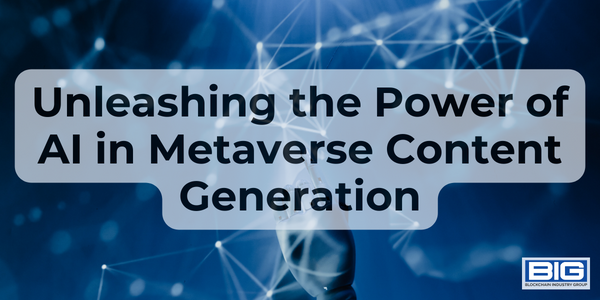
In the rapidly evolving landscape of the metaverse, artificial intelligence (AI) is emerging as a game-changer in content generation. AI technologies, such as machine learning and generative models, are revolutionizing the creation and customization of virtual environments, avatars, objects, and experiences.
In this in-depth article, we will explore the power of AI in metaverse content generation, examining its capabilities, potential applications, and the impact it is having on the future of virtual experiences.
The Rise of AI in Content Creation
AI has increasingly become an integral part of the content creation process in the metaverse. By leveraging vast amounts of data and advanced algorithms, AI systems can generate and modify digital assets, freeing creators from the constraints of manual design and enabling them to bring their visions to life more efficiently and effectively.
Customization and Personalization
AI-driven content generation in the metaverse goes beyond creating static assets. It enables customization and personalization, empowering users to shape their virtual experiences according to their preferences, identities, and aspirations.
In social virtual platforms like VRChat, AI algorithms analyze users’ preferences, behavior, and social interactions to create personalized avatars that reflect their individuality. These avatars can be dynamically modified and animated, allowing users to express themselves authentically in the virtual world.
Procedural Generation for Scale and Variety
One of the significant advantages of AI in metaverse content generation is its ability to achieve scale and variety through procedural generation. AI algorithms can generate vast amounts of diverse content, including landscapes, buildings, objects, and even narratives, without the need for manual creation.
For instance, the game “Minecraft” utilizes procedural generation techniques powered by AI to create expansive and unique worlds. Each time a player generates a new world, AI algorithms dynamically create terrains, biomes, structures, and resources, ensuring virtually limitless exploration and gameplay possibilities.
AI-Assisted Design and Collaboration
AI technologies are also facilitating collaboration and enhancing the design process in metaverse content creation. AI-powered tools and assistants assist creators in generating ideas, refining designs, and optimizing workflows.
In the field of architecture, AI-based design assistants, such as “Theia,” help architects generate and evaluate building designs based on specified constraints and objectives. These AI systems can propose innovative solutions, provide real-time feedback, and iterate designs quickly, accelerating the design process and enabling more efficient collaboration.
Ethical Considerations and Limitations
As AI becomes increasingly prominent in metaverse content generation, ethical considerations and limitations must be addressed. The use of AI raises concerns regarding data privacy, algorithmic biases, and the potential for the replication or misuse of copyrighted or sensitive material.
For instance, the use of AI to generate deepfake content in the metaverse raises concerns about the manipulation of visual and audio representations, potentially leading to misinformation or the unauthorized use of individuals’ likeness.
The Future of Metaverse Content Generation
The power of AI in metaverse content generation is poised to transform the way we create, consume, and interact with virtual experiences. As AI technologies continue to advance, we can expect even more sophisticated and immersive content, driven by personalization, scale, and collaboration.
The metaverse holds the potential for an infinite canvas of AI-generated content, where users can explore, create, and connect in unprecedented ways. However, as we embrace the AI revolution in metaverse content generation, it is crucial to consider and address the ethical implications and limitations associated with AI. Safeguarding data privacy, ensuring algorithmic fairness, and promoting responsible use of AI-generated content are essential for building a metaverse that is inclusive, secure, and beneficial for all users.
10 Ways the Metaverse Will Revolutionize Entertainment
—
20 Augmented Reality and Virtual Reality Use Cases
—
A New Reality: Rise of the Metaverse
Furthermore, collaboration between AI researchers, content creators, and policymakers is crucial to establish guidelines and standards that promote transparency, accountability, and ethical practices in metaverse content generation.
As the metaverse continues to evolve, AI-powered content generation will play a pivotal role in shaping the virtual experiences of tomorrow. By harnessing the power of AI, we can unlock new levels of creativity, personalization, and immersion, transforming the metaverse into a dynamic and limitless digital realm that captivates and inspires users worldwide.



